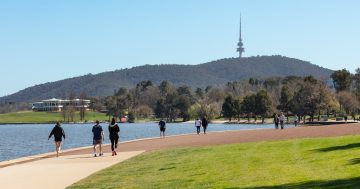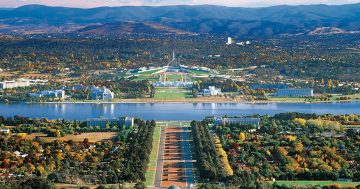Sharyn Davies and Chindy Christine* say that to be truly inclusive, Indonesia’s new capital city must reach out to women, young people and minorities.
 If you were designing a city from the ground up, what would you prioritise?
If you were designing a city from the ground up, what would you prioritise?
Affordable, quality housing with easy access to work, childcare, healthcare, education, and entertainment would surely be front runners.
An emphasis on environmental sustainability and clean energy would no doubt underpin these.
Indonesia has an opportunity to implement these elements in its new, purpose-built capital, Nusantara — but there is one more thing that must be a priority for planners: Ensuring the city is safe and supportive for all residents.
Relocating a capital city is not undertaken lightly, but Indonesia has no other option as its current capital, Jakarta, is quite literally sinking.
The megacity is home to more than 11 million residents but frequently swells to 30 million.
Over-population is not the only issue. Jakarta is built on a delta system of 13 rivers and 40 per cent of the capital now sits below sea level.
There are many reasons for this: Its aquifers are being depleted and the city is heavily built up, so water cannot soak into the ground.
Flooding is a regular problem that will increase with climate change, the growing population, and aging infrastructure.
Located on the island of Borneo, Nusantara is expected to be home to almost two million residents by 2045. It is hoped local and global talent will be enticed there.
Serious conversations about moving Indonesia’s capital had been going on for some time, but it was not until 2021 that a master plan was developed.
The first priority has been the construction of a toll road, Sepaku Ring Road, the main access road to Nusantara. This road is now reportedly 77 per cent complete.
Other priorities in this first period are land acquisition and developing a detailed engineering plan.
There are lofty goals for the new capital, including promoting economic equality and inclusivity, as well as deriving 100 per cent of its energy from renewable sources and ensuring 80 per cent of mobility is by public transport, cycling, or walking.
While these goals are impressive, a key consideration should be given to how the city will function for women and minority groups.
Nusantara must support and celebrate a diverse range of people. To develop a truly world-class liveable city, it must be inclusive.
To achieve inclusivity, the design team must be representative of the people who will live there.
If the appointed design team is made up of only able-bodied men, which is highly likely, the city will only be truly inclusive for men.
The design team must have tangible input from women and gender-diverse people, disability advocates, children and young people, locals and foreigners.
A key consideration must be whether women will feel safe. Since the new capital will reportedly have 75 per cent open green space, what security factors have been considered?
Will there be adequate lighting, monitoring, security guards, and safe and accessible transport? Will disabled people be able to take advantage of all the city has to offer?
Without disabled people on the design team, it is likely that accommodations will be at best tokenistic, at worst inappropriate.
There has been some consideration of the needs of women. For instance, the United Nations Sustainable Development Goals have been invoked in associated planning documents.
There does seem to be a desire to “achieve gender equality and empower all women and girls” and “prevent and eliminate all forms of discrimination, violence and harassment of women and girls in public spaces”.
However, there is no point just acknowledging the needs of women. What tangible practices will be put in place to support them?
There are some other issues with the new capital that will require creative solutions.
First, and ironic for a capital that is being relocated because of too much water, the new capital will experience water scarcity.
The region around Nusantara is prone to drought and has limited supplies of fresh water. Where will the water come from?
Second, planners have stressed they want to avoid issues arising from private investment, such as inequality and corruption, but they will be reliant on private funding to find the estimated $50 billion it will take to build the city.
Third, Indonesia has a track record of being great at the planning stage, but lacking in the implementation stage of major projects.
With such ambitious goals, bringing them to fruition seems to some an impossible endeavour.
For instance, the Government would like to move some Public Service offices to the new capital in early 2024, yet construction has barely begun.
Fourth, local residents have been vocal about their concerns of losing their homes and the destruction of sensitive rainforests.
Indigenous groups worry the Government will destroy their villages.
Given the Government does not acknowledge ancestral land claims, there is no legal mechanism for Indigenous landowners to be compensated.
Fifth, there are concerns about who will eventually live in Nusantara.
People in urban Jakarta question whether they will move there because they still see it as a forest, while Jakarta offers them everything they need.
In order for Nusantara to be an attractive destination for bureaucrats and others, it will need to ensure it offers things Jakarta does not, such as no congestion and breathable air.
It will also need to focus on offering some of the things people love about Jakarta such as a fabulous food scene, a dynamic arts sector and good transport connections to other places.
*Sharyn Davies is Director of the Herb Feith Indonesia Engagement Centre at Monash University. She can be contacted on Twitter @sharyndavies.
*Chindy Christine is a Master of Translation Studies student at the University of Western Australia, having a work placement at the Herb Feith Indonesia Engagement Centre.
This article first appeared on the Australian Outlook page of the Australian Institute of International Affairs.











